
Avowed Review
I came into Avowed with a little bit of baggage when it came to calibrating my expectations. As a fan of Obsidian Entertainment's Pillars of Eternity and especially of Pillars of Eternity II: Deadfire, the original reveal that a new title was going to return to Eora was a bit of shock to me. I enjoyed Deadfire a fair bit, but the title infamously struggled commercially despite critical success. Avowed is not Pillars of Eternity III, and I didn't really know what this meant for the new first-person RPG also set in the same world. Would the events of the Pillars titles be made irrelevant in the hopes of marketing Avowed to a wider audience? Or would the three games feel like a trilogy despite Avowed ostensibly being something different? Not only was I not sure which way it would land, I wasn't sure which way I wanted it to land.
Luckily, the result was something that I found myself incredibly pleased with. Despite having not revisited Deadfire since its launch several years ago, booting up Avowed still managed to feel like fondly returning home.
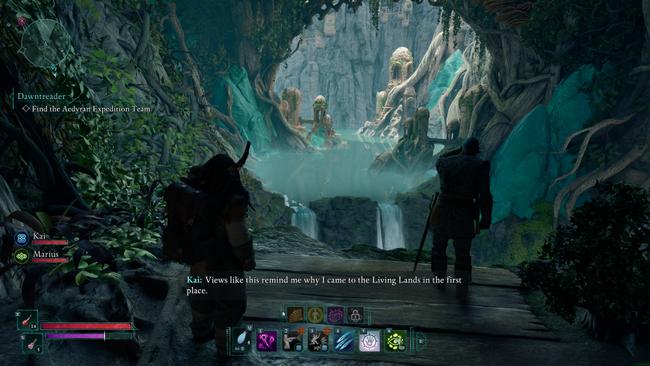
Avowed takes place a few years after the events of Deadfire, and takes place in an independent region of Eora known as The Living Lands. Players take the role of an unusual Godlike - referring to a marked population of people that physically resemble one of Eora's deities from a large pantheon of gods and goddesses. Early on, Avowed is not shy to mention names and places and reference past events, despite not being directly connected to the past games. In this way, I found myself immediately invested in the separate narrative present here, but it did leave me wondering how newcomers to the series (can I even say it that way?) will take to the heavy lore dumps early on. The initial narrative onboarding here is pretty steep.
Either way, Avowed does something that I'm always happy to see -- it sells me on a world that feels lived in and bigger than what's in the player's direct perspective. Offscreen characters and locations are referenced, events of the past are mentioned in passing without having everything explained to the player through a set of monologues. Some details have to be gleaned or inferred, but the tradeoff of feeling like part of something much grander and older is well worth it. In this way, Avowed's lore and worldbuilding is just as interesting, if not moreso, than its story.
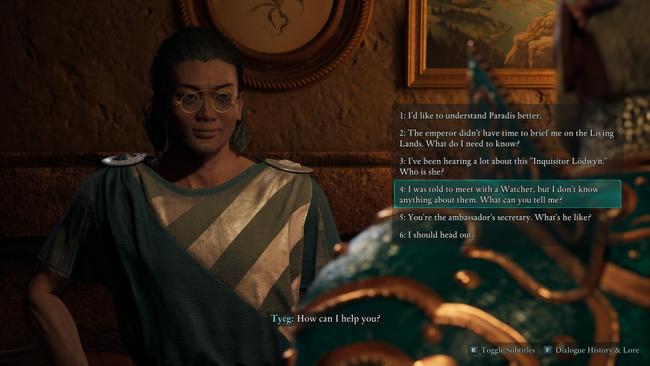
On the story front, things start out rather slow. The protagonist -- despite their Godlike status -- is selected to be an Envoy of the Aedyran Empire. Tasked to investigate the cause of a mysterious blight known as the Dreamscourge, the Envoy finds themselves in the Living Lands, but on largely unfavorable terms. The Living Lands is full of native populations that see the encroaching Aedyrans as a hostile conquering force. In some ways, it reminded me of the setup of Greedfall, which also placed players in an unlikeable position of influence.
The key premise is that the protagonist begins to hear a voice in their head -- first only when near the strange adra minerals of the region, and eventually as an almost entirely second conscious presence in their mind. The evolving relationship between the protagonist, this voice, and the Dreamscourge itself is at the core of Avowed's narrative progression, with the aggressive Steel Garrote (effectively an Aedyran police unit) serving as an additional antagonistic force. When the mysterious voice saves the protagonist from death early in the game, this kicks off a growing inter-relational conflict that eventually places the player in a position to make civilization-altering decisions by the climax of the game.
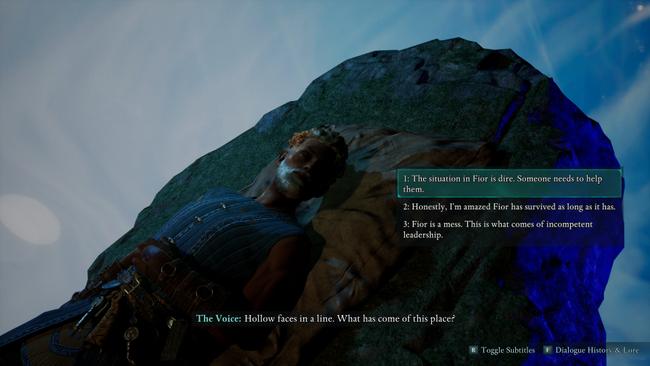
Both Pillars games were often criticized for being 'dry', and I honestly feel a little bit of the same DNA in Avowed, but surprisingly not to the detriment of my enjoyment. I found myself very engaged with the story, which is witty, well-written, and very well voice acted -- the pace feels a little bit more like a documentary than an action movie. Once I settled into this though, it felt very appropriate for the world and its setting. Companion characters are charming and relatable, and they manage to avoid having just 'one defining character trait", which makes them tricky to succinctly summarize. Kai is not always proud of his past and of his nation's aggressive tendencies, but also in many cases chooses not to have personal regrets. Marius, on the other hand, has several moments of his past that he is shy to talk about and hesitant to confront, even when pushed. Giatta and Yatzli have similarly nuanced relationships with Animancy and the mysterious history of the region's "Godless" people, respectively. While having four party members seems countably small, each contributes massively to the interactions between the player and world, and they provide multiple viewpoints on the world of Eora as a whole.
I can usually feel pretty confident going into an Obsidian title and expecting a well-written story. Where Avowed surprised me the most, however, is how excellent exploration feels in this game. Every region of the map is absolutely packed with secrets, events, unique items, hidden caves, and grottos, even some fairly lengthy optional dungeon-like areas. While many RPGs may dot a very large map with points of interest, cities, and locations with lots to discover, there is often a fair bit of dead zone between these nodes of interest. I can barely walk a few feet in Avowed without finding something that calls for my attention, especially in the first two zones.
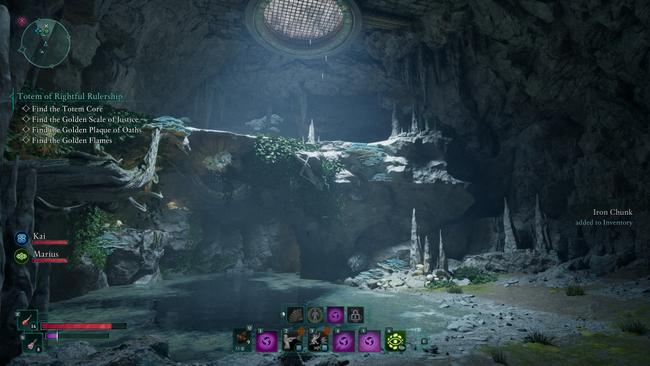
Avowed uses a pretty standard "fog of war" effect in its maps, where unexplored areas are presented with a white haze while explored and discovered areas are revealed upon passing through them. Avowed's maps are so densely packed that I learned pretty quickly that even a tiny sliver of remaining fog on the map was likely hiding something that I hadn't stumbled upon yet. The latter two of Avowed's four maps have a little bit more breathing space, but only just so. There are four major regions to explore, and exploring them thoroughly took me about 10-15 hours each. Some early comparisons to The Outer Worlds are not entirely wrong, but I feel there's a lot more to unpack here.
Avowed fills each area of the game with several tasks that are typical of the genre: bounties that ask the player to defeat minibosses strewn throughout the region, treasure maps that subtly hint at hidden goods tucked away in hard-to-find places, optional combat encounters, and the chance to discover rare and unique items or gear. Each region also has several side quests that can sometimes interweave in interesting ways. Unlike Outer Worlds which had a fair bit of dead space between areas, Avowed's regions are filled with things to do and rarely boring.
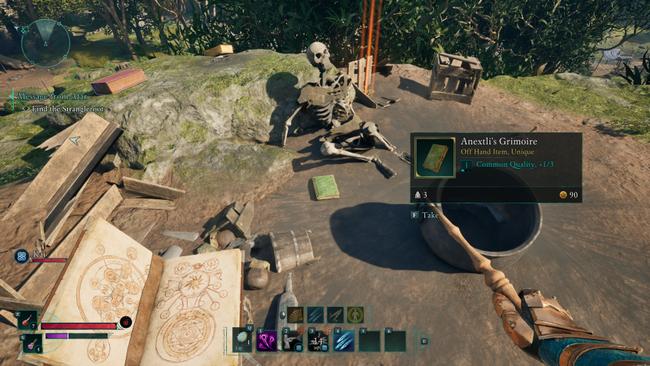
The level of platforming incorporated into the exploration was also an unexpected surprise. Working one's way up tall structures or finding a path through a winding series of caves became second nature only a few hours in. Many secrets are usually hidden by asking the player to 'work vertically' in a sense. There are frequent environmental hints that clue in observant players on where and when to jump such as dangling ropes, lit torches, or some scuff marks, with thankfully limited yellow paint to be found here.
Thorough exploration becomes rewarding in Avowed in multiple ways. To explain that, I need to quickly touch on how gear works. Avowed has a basic assortment of armor, weapons, and accessories like boots, trinkets, and rings. Gear is assigned a tier from I to V, with the highest tier gear being Legendary. While this sounds very well-worn and not unique on its own, Avowed shakes things up by also assigning enemies a similar rating from I to V. Enemies that exceed the gear currently equipped by the player will get a bonus to their damage -- conversely, if a player goes up against an enemy who outranks their armor, they'll receive a penalty to all damage incurred. Even on the Normal difficulty setting, I often found myself tangling with enemies at my "tier level" or higher, and there was always an incentive to keep all my gear up to date.
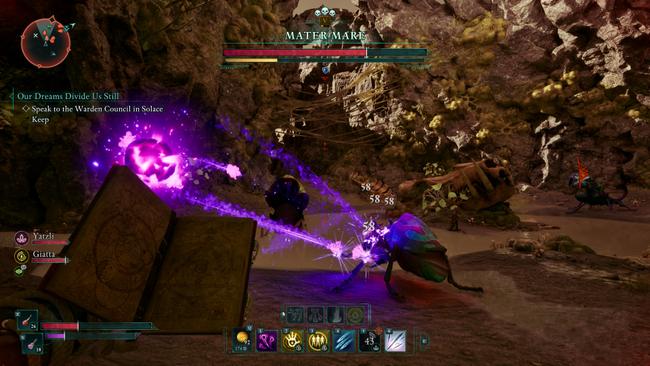
Combat itself is a bit hectic, but I found myself enjoying it a fair bit. I decided early on to play a mage-type character, which has an interesting implementation of spell grimoires and wand attacks. My build ended up very 'glass-cannon', so I constantly found myself shifting for position and leverage in a fight, else I could find myself deleted in a couple of hits. There are multiple skill trees from Fighter to Ranger to Wizard, and any can be selected by any character, so I am curious about what sort of hybrid builds people will end up coming up with. While I did not play one myself, I did notice that the Fighter skill tree is most proportionally slotted with passive abilities, so I'm curious if players going for a more physical build may end up feeling less impressed by the combat overall compared to those using bows, guns, or magic.
As you progress through the game's four regions, enemies will steadily get more dangerous -- starting out between tiers I and II in the first zone, improving to III in the second zone, and so on. This means that I found myself constantly either looking for the supplies (like leather or metal) to improve my current gear, or hoping to find replacement gear of a higher rarity. This brings me to the next point: Avowed is jam-packed with an unexpectedly high number of unique weapons, armor, and accessories, each with unique effects. While it can sometimes be frustrating to try to find a piece of gear that fits a player's intended build, every weapon and armor can be upgraded from tier to tier as desired. So even if someone finds the perfect sword that fits their playstyle in the first zone and never plans to change it, they'll still be incentivized to explore around to gather the materials needed in future regions so that it doesn't statistically fall behind.
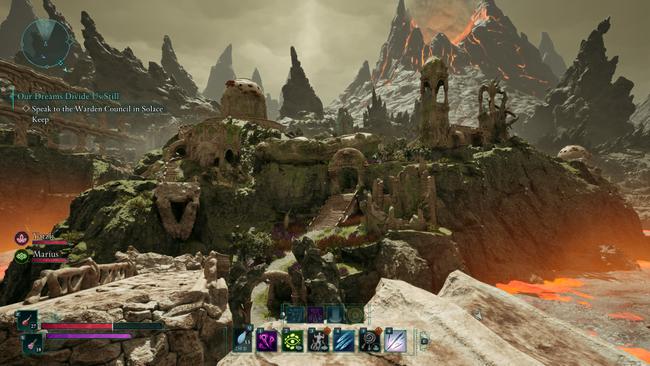
Avowed even manages to nail the seemingly impossible task of making the economy of buying and selling gear, or stocking up on consumables, not feel like a complete afterthought. Some rare items can be found in shops, but I was never loaded enough to afford everything I wanted. At the same time, I often found myself buying shop goods like lockpicks and crafting supplies just to supplement what I naturally found out in the world, which was often limited. I would often not be sure whether my best course of action would be to break down unneeded weapons for materials or sell them for gold. As a spell-focused character, I actually found one of my favorite wands in a shop that cost more than half my wallet when I bought it. While this does mean that I was often unsure of if I was making the best decisions with my resources and currency, I find it highly preferable to being able to afford everything (or nothing) without a second thought.
In this way and others, it feels like Avowed is balanced in many ways around very thorough exploration. I naturally play most games this way, but despite trying to complete every side quest, explore every cave, and so on, I never found myself feeling 'over-leveled'. I often still found myself lacking resources or coming to blows with enemies that still had the edge on me. In addition to the smart design of the overworld and the density of interesting locations, this meant that every treasure chest I found full of even basic materials remained meaningful.
While I actually really enjoyed this friction, it does make me wonder how those who just want to follow the main story and dabble in a few quests might feel. Luckily there are difficulty modes ranging from Story to Path of the Damned, but it's rare to find of game of this style where being a completionist didn't also result in me feeling like a god walking among mere mortals.
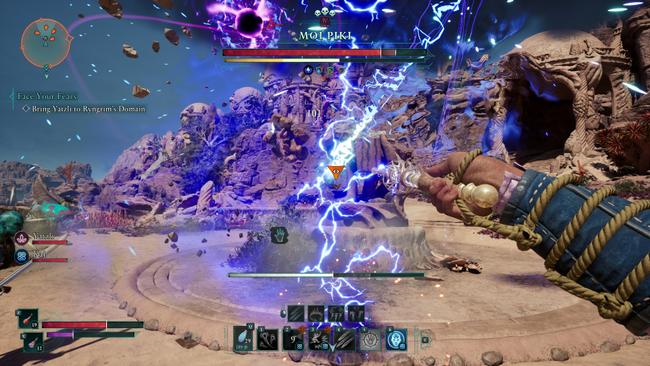
Environmentally, I found the artstyle of Avowed to be really pleasing as well. While the initial gameplay reveal was scowled at a little bit for being cartoony with saturated colors and slightly exaggerated proportions, the end result feels very fitting to the world and story. Spells are flashy, ruins feel appropriately ancient, and cities feel lived-in. In this way, it feels like every individual component complements the rest.
When it comes to questing, my favorite aspect of their implementation here is not the direct impact of the so-called "choice and consequence" of past decisions, but the small nods that remind the player that the world and its inhabitants keep moving even after a quest happens to be marked complete in the journal. For example, an early quest in the first region of the game finds an NPC having to effectively share a living space with a friendly Xaurip - an anthropomorphic lizard beast that is usually very antagonistic. After solving this early quest, I noticed you could later find the NPC in the market, shopping for extra meat in order to feed her new reptilian roommate. There's no flag or objective or reward for finding her in the market at this point, there's nothing even indicating she's there. It's just an attention to detail that illustrates how the player's actions can affect the island's inhabitants in small and big ways. Finding these little sorts of interactions never got old.
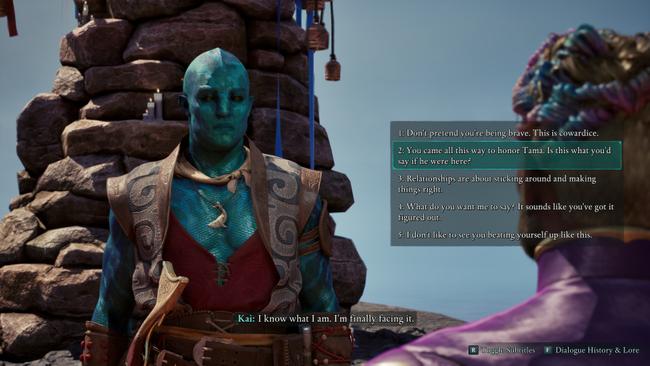
Another quest involves two older characters who need some help moving to the town of Thirdborn, and they ask the player to help recover a land deed for their destination. However, during the course of this quest, you learn that they are actually ex-convicts guilty of murder. They state that they just want to move on to the next phase of their life, and the player ends up with the position to either be sympathetic to them or turn them into the authorities. The dilemma is framed in a way where neither option seems wholly correct. Natrually, if you send them to Thirdborn, you'll find them there later. Again, there is no reward or 'purpose' for noticing them, but it makes the quest outcome feel natural and meaningfully followed up on. Many quests in Avowed are like this. This results in the entire world space feeling very cohesive and, again, lived-in.
There are even unmarked 'micro quests', that aren't flagged in the quest journal at all. One bartender wanted me to speak to another named NPC to check on the status of a shipment for her shop. Without any waypoint to guide me, I was able to find this person, come to an agreement, and return to the shop for a minor gold reward. Another NPC out in the world wanted me to clear out some Dreamscourged zombies from encroaching on her husband's grave. I found them, defeated them, and watched her move over to pay her respects. She gave me nothing, which is actually not an uncommon occurrence. I was initially wondering if some of these interactions were bugged, having been so conditioned that anything with that sort of progression in a game like this "must" be for some reason or reward. But Avowed has enough of these that their ultimate purpose ends up being part of the overall storytelling more than anything.
It's not always perfectly executed though. A late-game quest decision resulted in several characters from one of the major cities ending up dead. However, despite deliberately going down this path to see what the level of consequence was, it felt like the decision did not affect many (if any) named NPCs, shops, or quests. Almost as if it was scared to have a quest outcome put me at a disadvantage, which I was surprised by. It felt convenient in terms of a video game, but a little bit hollow for an outcome that was initially presented as having some real weight.

I also ran into a moderate number of bugs including some quests that seemed to not trigger quite correctly, or bounty targets that respawned after I had already defeated them. Once, upon defeating an enemy and needing to retrieve an item from his corpse, I had to reload a save after the item fell through the floor. The day one patch is listed to fix many of these, so hopefully remaining issues are quickly polished out, but they required me to be a little bit more diligent with my save files just in case.
One final narrative criticism is that at the conclusion of a long game that feels like a slow but inescapable crescendo, the ultimate payoff feels like it never quite crests. It's possible that there are multiple ending permutations and the one I ended with was just one of many, but either way, I found myself quite whelmed by the time credits rolled.
With that said, Avowed is exemplary of the sort of game where the more I put into it, the more I get out of it. Not in an "it gets good 20 hours in" sort of way, but more like I needed to slowly parse through the character interactions, story moments, the marriage between exploration and resource management, and the cohesive coupling between these components that all subtly contributed to my overall enjoyment. At its best, Avowed is quite precisely the sum of its carefully crafted parts, though infrequent moments of uneven execution slightly mar the overall experience.